#as if kubo didn’t also make /a choice/ for orihime’s appearance in the final chapter
Explore tagged Tumblr posts
Text
ANONYMOUS ASKED: I was following along a thread on twitter and an anti said when Ichigo laid dead on the ground with a hole in his chest in the Lust arc, that he didn’t say “I can hear her..stand up..I will protect her” before hollowfying. They claim he instead said “I can hear..stand up..I have to protect” using no pronounce directed at Orihime, hence NOT coming back from the dead because he wants to protect her specifically but because of his instincts to protect and he would’ve done it for any of his friends. They also said that Orihime didn’t scream “help me” but instead said “help” which triggered Ichigo’s instincts to protect, making him rise from the dead, hence once again making it clear this was never about Orihime specifically but about Ichigo’s instincts responding when hearing a voice in need (and this voice could’ve been from anyone amongst his friends) and how the hollow would not allow him to die regardless. Basically the English translations are incorrect and the raw version in kanji never used pronounces during these scenes. Is this correct and how would you respond to this?
There are a couple really important factors to address in this translation and why its English counterpart would supplement with pronouns specifically referring to Orihime; first, that Ichigo’s speech is meant to be broken and fairly incoherent because it’s conveying the idea that he as a human is focused on this sole objective as he’s dying. Second, that in Japanese, there isn’t necessarily a requirement for subject pronouns to form a sentence talking about a subject (the subject in question being Orihime) —this is a particular grammar rule that has no translatable equivalent in the English language, because they’re ultimately different structures entirely. I drop this phrase a LOT on here, but again, cultural context is important. Since you also sent this ask to my friend @ichinoue, there’s been some really excellent fan feedback about the structure of Japanese language and how it differs from English —this post in particular.
Now — onto the actual question:
I think there’s definitely a possibility that Ichigo would have done this for his other friends, but only if this moment had also been preceded by Ichigo vowing to “definitely protect” or “protect without fail” those other friends. Kubo did write a scene like this, and made a pretty big deal about it, but that scene involves one specific character —not all of his friends.
This hollow transformation was written as a climax in Ichigo’s narrative arc for the Hueco Mundo saga —as the ongoing theme during this arc was about his struggle with his identity against his inner hollow as an ever-present threat. This could not be a more clear theme throughout this specific arc. There’s a lot of specific focus placed upon this struggle, his cooperation and subsequent training with the Visoreds, his lack of control despite his best efforts, and his juxtaposition of this struggle for control in his actual fights against the Arrancar and Espada. This is important to note, because in response to this, there is only one scene with one character that both:
Involves him promising to “definitely protect” or “protect without fail” a friend he cares deeply for (using the same character for “protect” that’s his namesake, no less —I’ll get into this tidbit more further down).
Functions as a foreshadowing tool, and is later double-downed upon as a foreshadowing tool by the same character as mentioned above.
When it comes down to it, the grammatical inconsistencies that come from translating between languages don’t have any particular bearing on this specific scene, because the intent was already made clear as early as Chapter 196. That’s how foreshadowing works —even if we as the reader don’t realize it’s happening until after the fact. What’s more, this is how Japanese functions as a language; it’s constructed around making sense of the context, which is why it doesn’t necessarily need subject pronouns to function or convey meaning. (Though I can understand why this goes over most Anti-IHs heads... their arguments depend almost entirely on pulling things out of context, which obviously doesn’t work.)
That said —
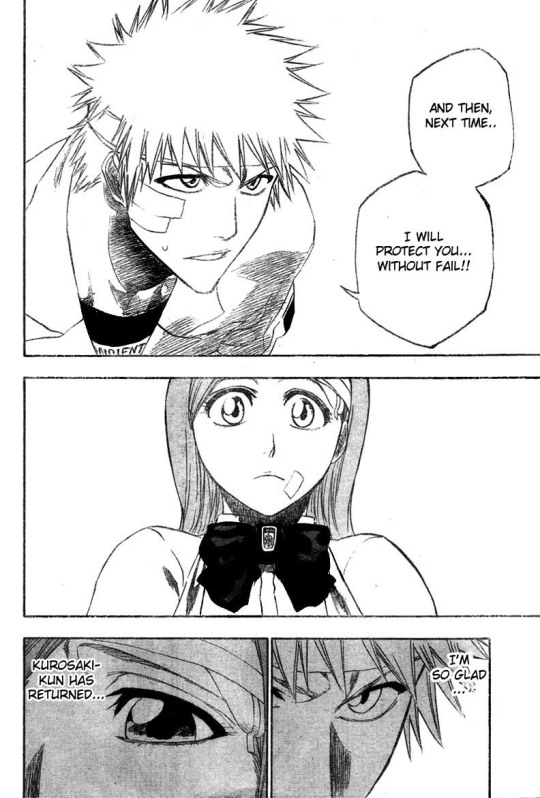
This scene says a lot. And even though Ichigo is speaking directly to Orihime so we understand she is the subject of what he’s saying, there’s a lot of additional meaning we can derive from this scene by reading (you guessed it) the context.
Ichigo is characterized early on by somewhat brash, irritable (though this is conditional), impolite, “punk”-like mannerisms. His speech tends to be informal (cultural context) as does his body language. However, we also know that he doesn’t say things lightly when it comes to promises and protecting others. These words carry weight, but there’s an additional sense of conviction conveyed through his respectful and formal gesture of bowing, his unwavering eye contact, and we as the readers can understand this without needing an explanation.
This is especially interesting because if IRs want to get smart about raws, then they should also already understand the additional importance placed on this scene when it comes to Ichigo’s word choice. Ichigo uses the character “護” (mamoru / ”to protect”) to convey his intentions. There are a lot of different ways to write “protect” in Japanese, many of which Ichigo uses when he makes these promises or talks about protecting others throughout the series. What makes his choice of “護” especially significant and piles on more and more contextual importance is that this is the same character for “protect” that is his namesake and the basis for his core character motivations. This is also only time throughout the entire series Ichigo specifically uses “護” to refer to protecting someone.
If the intention of this to act as a foreshadowing tool wasn’t clear enough, it is again referenced by Orihime later —just at the beginning of the fight between Ichigo and Grimmjow.
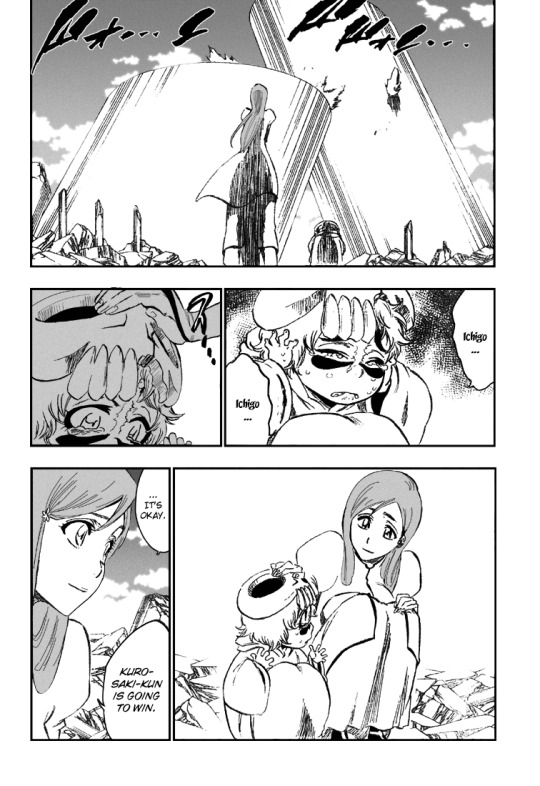
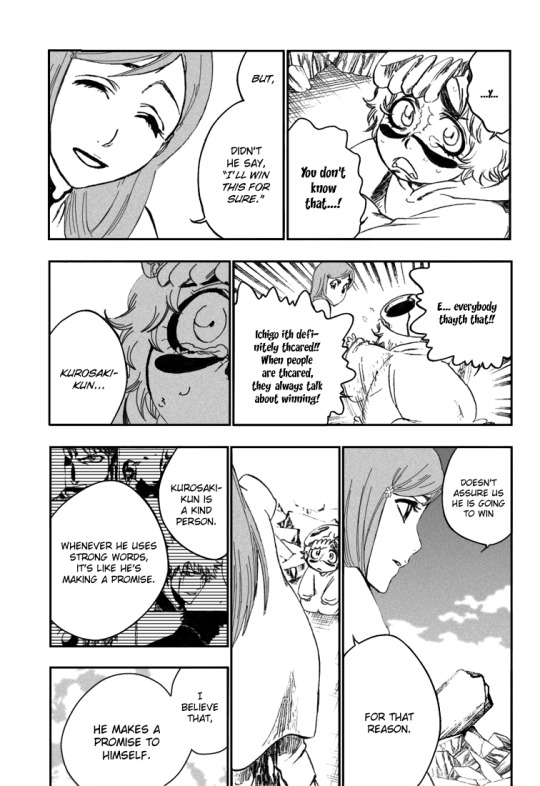
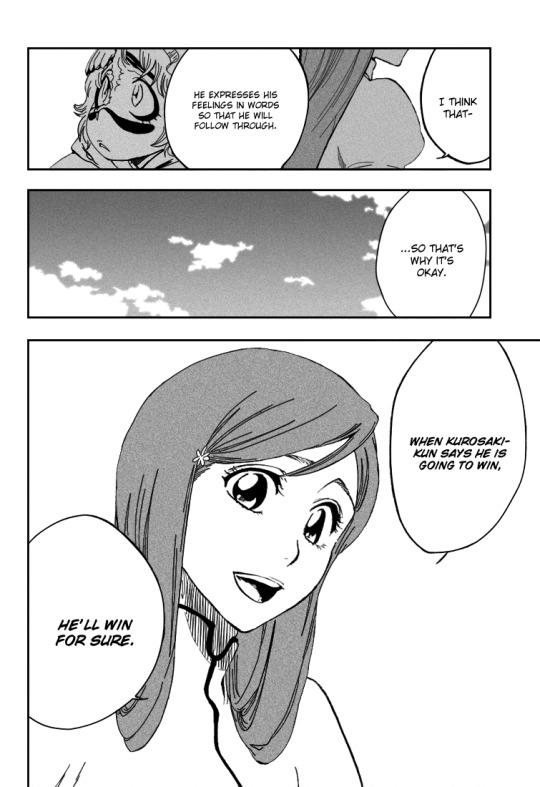
Already, we have a precedent set by Orihime’s direct involvement. This is the second scene in a pattern of foreshadowing the events of the Lust Arc.
The intent is clear; this is a theme in Ichigo’s narrative arc that involves Orihime, because it also involves the development of their relationship. Her fear of hollows, her fear of Ichigo losing himself to his hollow side, Ichigo’s struggle to expose himself to this power he relies on to win in battle while also trying not to lose himself. There’s an underlying theme of Ichigo and Orihime struggling to communicate with each other, desperately wishing to protect each other and going to whatever ends to do it, but ultimately thinking its a burden they must shoulder alone. They are both concurrently struggling with feelings of uselessness (Ichigo isn’t strong enough, Orihime can’t do anything) throughout this arc, acting as foils even if their individual journeys take different shapes. Even so, these conflicts are juxtaposed by the theme of “The Heart” (the bonds between people) that also keep appearing. They’re both frightened, they’re both feeling weak, feeling desperate, and yet still — they can understand one another.
So we have this pattern now:
Ichigo vows “Next time... I will protect you... without fail!” to Orihime with a sense of personal importance conveyed through the use of his name that is unmatched throughout the rest of the series.
Later, Orihime notes very plainly that “Whenever he uses strong words, it’s like he’s making a promise. I believe that he makes a promise to himself. I think that he expresses his words in feelings so that he will follow through.” The important takeaway being of course the forthright meaning, but also “When Ichigo says he’s going to [do something], he will [do that something] for sure.”
We all know what happens next —the character conflicts, the miscommunications, the belief that these are fights that need to be handled alone, the struggle against the powers of a hollow, the fear of exposure to that power... all culminate into The Lust Arc.
— CONTENT WARNING for canon-typical gore, blood, impalement, and body horror.
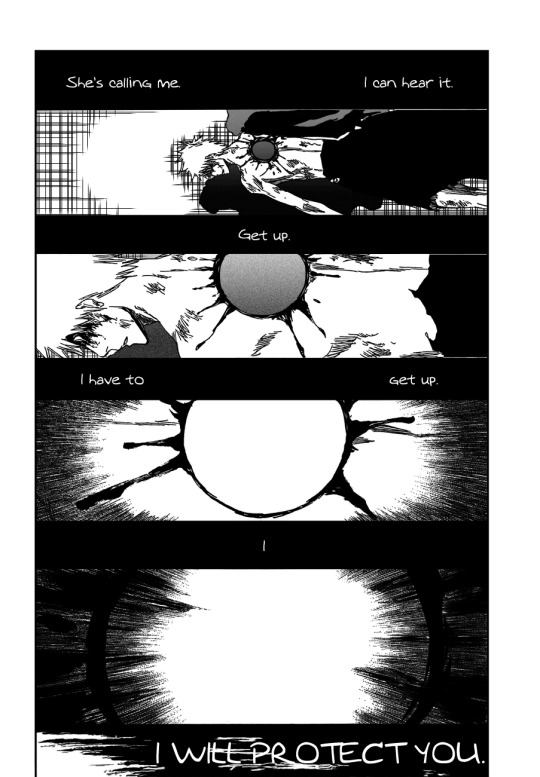
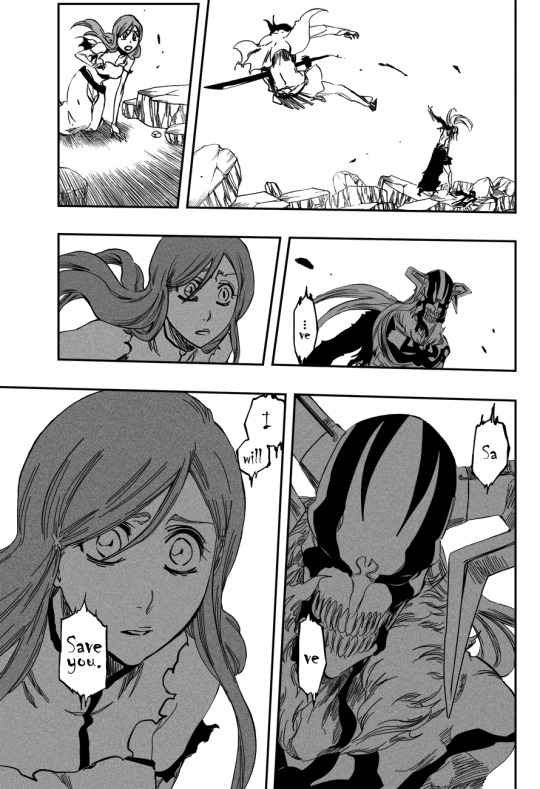
With the above established foreshadowing, we can see how it leads to this; When Ichigo says that “he will protect you without fail”, he will protect you for sure.
“To be clear, a total transformation to a hollow, is neither evil or good; it’s more like pure power .. so I made a voice of pure-hearted power that is unrelated, beyond the concept of good and evil so I screamed from a clear pure heart yet, at the same time there is some sadness and thought of Orihime in my head.”
— Masakazu Morita (Ichigo Kurosaki’s Japanese VA), on how he voiced Hollowfied!Ichigo during the Lust Arc.
“The perfectly hollowfied Ichigo ruminated over Orihime’s screams and was bound only by that objective.”
— Bleach UNMASKED
If what I outlined above wasn’t clear enough, Ichigo goes as far as to stab Ishida, his friend. It couldn’t be about anyone else. This specific theme has always very clearly been about Ichigo, Orihime, their relationship to each other, and their relationship to hollowfication as a concept.
I want to also be very clear here as well; with the established theme of Ichigo always fighting against his hollowfication, and Ichigo’s Hollow being motivated solely by self interest — it isn’t Ichigo’s Hollow responding to Orihime’s plea, it’s Ichigo’s humanity. Ichigo’s Hollow finally getting an opening to take over his host (to become The King and Ichigo, The Horse) is what revives Ichigo. But his vow to Orihime and his desire to fulfill that promise is what allowed him to cling to his humanity. The Hollow is motivated by survival instinct, not any desire to protect —that’s all Ichigo, just as it’s always been.
I think anyone who is still willfully misinterpreting this and holding Japanese language structure to English rules and conventions is seriously pathetic. Even in English, the pronouns have zero bearing on what’s being conveyed here. They can try and disprove IchiHime as much as they want as far as I’m concerned. The fact remains that at the end of the day, giving the Ichigo/Orihime relationship as much attention and dissection as they do goes to show that (a) they still perceive it as a threat and (b) there’s such a large volume of Ichigo/Orihime content to comb through to begin with —a fact they’ve vehemently denied for years.
Also like, IchiHime is canon. They’re happily married. They have a family together. Just tell them to take the fucking L. I get secondhand embarrassment from watching them rehash the same old bullshit time and again.
282 notes
·
View notes